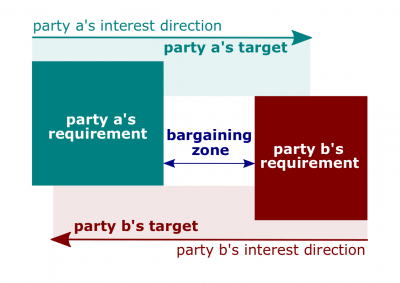Difference between revisions of "Distributive bargaining"
(→Related lectures) |
(→Definitions) |
||
| Line 4: | Line 4: | ||
According to [[Organizational Behavior by Robbins and Judge (17th edition)]], | According to [[Organizational Behavior by Robbins and Judge (17th edition)]], | ||
:[[Distributive bargaining]]. Negotiation that seeks to divide up a fixed amount of resources; a win-lose situation. | :[[Distributive bargaining]]. Negotiation that seeks to divide up a fixed amount of resources; a win-lose situation. | ||
| + | According to [[Labor Relations and Collective Bargaining by Michael R. Carrell and Christina Heavrin (10th edition)]], | ||
| + | :[[Distributive bargaining]]. A negotiation method described as a "win-lose" situation, in which resources are viewed as fixed and limited, and each side wants to maximize its share. | ||
==Related lectures== | ==Related lectures== | ||
Revision as of 00:09, 1 November 2019
Distributive bargaining (hereinafter, the Bargaining) is negotiation that seeks to divide up a so-called fixed pie or limited amount of resources; a win-lose situation.
Definitions
According to Organizational Behavior by Robbins and Judge (17th edition),
- Distributive bargaining. Negotiation that seeks to divide up a fixed amount of resources; a win-lose situation.
According to Labor Relations and Collective Bargaining by Michael R. Carrell and Christina Heavrin (10th edition),
- Distributive bargaining. A negotiation method described as a "win-lose" situation, in which resources are viewed as fixed and limited, and each side wants to maximize its share.
